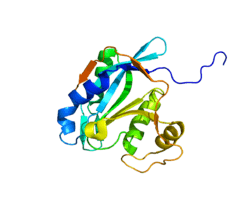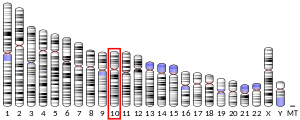STAMBPL1
AMSH-like protease is an enzyme that in humans is encoded by the STAMBPL1 gene.[5][6][7]
References
- GRCh38: Ensembl release 89: ENSG00000138134 - Ensembl, May 2017
- GRCm38: Ensembl release 89: ENSMUSG00000024776 - Ensembl, May 2017
- "Human PubMed Reference:". National Center for Biotechnology Information, U.S. National Library of Medicine.
- "Mouse PubMed Reference:". National Center for Biotechnology Information, U.S. National Library of Medicine.
- Kikuchi K, Ishii N, Asao H, Sugamura K (Jun 2003). "Identification of AMSH-LP containing a Jab1/MPN domain metalloenzyme motif". Biochem Biophys Res Commun. 306 (3): 637–43. doi:10.1016/S0006-291X(03)01009-X. PMID 12810066.
- Kitajima K, Matsumoto K, Tahara M, Takahashi H, Nakamura T, Nakamura T (Aug 2003). "A newly identified AMSH-family protein is specifically expressed in haploid stages of testicular germ cells". Biochem Biophys Res Commun. 309 (1): 135–42. doi:10.1016/S0006-291X(03)01550-X. PMID 12943674.
- "Entrez Gene: STAMBPL1 STAM binding protein-like 1".
Further reading
- Nagase T, Kikuno R, Ishikawa KI, et al. (2000). "Prediction of the coding sequences of unidentified human genes. XVI. The complete sequences of 150 new cDNA clones from brain which code for large proteins in vitro". DNA Res. 7 (1): 65–73. doi:10.1093/dnares/7.1.65. PMID 10718198.
- Strausberg RL, Feingold EA, Grouse LH, et al. (2003). "Generation and initial analysis of more than 15,000 full-length human and mouse cDNA sequences". Proc. Natl. Acad. Sci. U.S.A. 99 (26): 16899–903. doi:10.1073/pnas.242603899. PMC 139241. PMID 12477932.
- Ota T, Suzuki Y, Nishikawa T, et al. (2004). "Complete sequencing and characterization of 21,243 full-length human cDNAs". Nat. Genet. 36 (1): 40–5. doi:10.1038/ng1285. PMID 14702039.
- Ibarrola N, Kratchmarova I, Nakajima D, et al. (2004). "Cloning of a novel signaling molecule, AMSH-2, that potentiates transforming growth factor beta signaling". BMC Cell Biol. 5: 2. doi:10.1186/1471-2121-5-2. PMC 385422. PMID 14728725.
- Li H, Seth A (2004). "An RNF11: Smurf2 complex mediates ubiquitination of the AMSH protein". Oncogene. 23 (10): 1801–8. doi:10.1038/sj.onc.1207319. PMID 14755250.
- Deloukas P, Earthrowl ME, Grafham DV, et al. (2004). "The DNA sequence and comparative analysis of human chromosome 10". Nature. 429 (6990): 375–81. doi:10.1038/nature02462. PMID 15164054.
- Gerhard DS, Wagner L, Feingold EA, et al. (2004). "The status, quality, and expansion of the NIH full-length cDNA project: the Mammalian Gene Collection (MGC)". Genome Res. 14 (10B): 2121–7. doi:10.1101/gr.2596504. PMC 528928. PMID 15489334.
- Rual JF, Venkatesan K, Hao T, et al. (2005). "Towards a proteome-scale map of the human protein-protein interaction network". Nature. 437 (7062): 1173–8. doi:10.1038/nature04209. PMID 16189514.
- Nakamura M, Tanaka N, Kitamura N, Komada M (2006). "Clathrin anchors deubiquitinating enzymes, AMSH and AMSH-like protein, on early endosomes". Genes Cells. 11 (6): 593–606. doi:10.1111/j.1365-2443.2006.00963.x. PMID 16716190.
- Reyes-Ibarra AP, García-Regalado A, Ramírez-Rangel I, et al. (2007). "Calcium-sensing receptor endocytosis links extracellular calcium signaling to parathyroid hormone-related peptide secretion via a Rab11a-dependent and AMSH-sensitive mechanism". Mol. Endocrinol. 21 (6): 1394–407. doi:10.1210/me.2006-0523. PMID 17426287.
This article is issued from Wikipedia. The text is licensed under Creative Commons - Attribution - Sharealike. Additional terms may apply for the media files.




